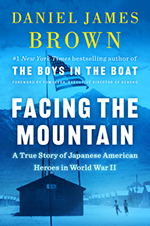Reviewed by LaVonne DuBois
 Immediately following the bombing of Pearl Harbor, Japanese Americans were under suspicion and soon found themselves herded into internment (War Relocation) camps, leaving behind homes and businesses they had spent decades building. Despite this harsh treatment, many of the young men volunteered to enlist in the military, serving their country in Europe. Brown followed the 442nd Regimental Combat Team, an all Japanese American regiment, who were deployed to France, Germany and Italy. They were asked to do nearly impossible missions, which they successfully carried out with determination and valor. Many died in these battles but this regiment earned more distinguished service awards and crosses than any other group in the war.
Immediately following the bombing of Pearl Harbor, Japanese Americans were under suspicion and soon found themselves herded into internment (War Relocation) camps, leaving behind homes and businesses they had spent decades building. Despite this harsh treatment, many of the young men volunteered to enlist in the military, serving their country in Europe. Brown followed the 442nd Regimental Combat Team, an all Japanese American regiment, who were deployed to France, Germany and Italy. They were asked to do nearly impossible missions, which they successfully carried out with determination and valor. Many died in these battles but this regiment earned more distinguished service awards and crosses than any other group in the war.
In 2000, President Clinton conferred Medals of Honor on twenty members of the regiment, some of them posthumously, saying "Rarely has a nation been so well served by a people it has so ill served." (Among those receiving this honor was Daniel Inouye, who served as a Senator from Hawaii for 49 years).
Can you share a quote from the book that was meaningful to you?
Chaplain Higuchi, who served with the 442nd, wrote in a letter to his wife, Oct. 1944:
"Oh Lord when will this horror end. Whenever I pass one of our men so still in the road with their body covered—I think of some family in the islands—think of the bright future the young lad might have had—all because a couple of mad men in the world wanted everything for themselves."
What was a new thought of a key takeaway?
How quickly and widely we vilify people we consider "the other". It seems to be universal, labeling and blaming. It's been disappointing to see this happen with the recent virus and anti-Asian sentiment in our country.
What action will you take as a result of reading this book?
Continue to advocate for the "others" in our community, to see people as Jesus did, with love and compassion and call out those who use, discriminate against and discard them.
Is there anything else you'd like to share about this book?
I was interested to learn the Japanese value system taught by their parents: to live with rectitude, courage, benevolence, politeness, honesty, honor, loyalty, self-control. Their social obligation was to give human warmth and compassion. Yet they were treated so poorly. Ironically, the German POWs were treated better than the Japanese in the WRA camps.
